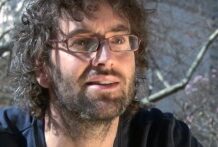Navigating the Mental Health Wilderness: Steven Morgan’s Journey
Steven Morgan discusses his transformative journey from chronic "patient" to leading mental health advocate. Steven has been working in peer support and helping to create alternatives to traditional mental health services for the past decade...
Daniel Mackler:Motivators for Growth
Therapist and folk artist Daniel Mackler discusses the major barriers to creating a more effective and compassionate psychiatric system, as well as the practice of Open Dialogue in Finland, and recognizing pain as a motivator for growth.
How to Escape Psychiatry as a Teen: Interview with a Survivor
When I lived in Massachusetts I taught yoga and led writing groups for alternative mental health communities. While the organizations I worked for were alternative, many of the students and participants were heavily drugged with psychiatric pharmaceuticals. There was one skinny teenager I'd never have forgotten who listed the drugs he was on for me once in the yoga room after class: a long list of stimulants, neuroleptics, moods stabilizers; far too many drugs and classes of drugs to remember. I was at the housewarming party of an old friend, and who should walk in but that boy who used to come to my yoga classes and writing groups religiously. And he was no longer a boy; he was now a young man. “I'm thinking yoga teacher,” he said. I nodded. Did he remember where? “I'm not stupid,” he said, as if reading my mind. “I'm not on drugs anymore. I'm not stupid anymore.”
Pick Up a Pen, I Dare You
When I pick up a pen, I put down my fear. Sorry, they don't both fit into my hand at once. Meditation teachers often say the hardest part is getting to the cushion. The hardest part of writing is probably picking up the pen. So, pick up a pen, I dare you. Write even if you think no one will read it, even if you don't want anyone to read it.
Navigating Brilliance and Madness: Sascha Altman DuBrul at TEDx
From youtube: "Sascha Altman DuBrulhas been documenting and fomenting underground culture and radical peoples' movements since he was a teenager. From the anarchist squatter...
Sera Davidow: “Non-compliance Saved My Life”
Sera Davidow, MIA Blogger and Director of The Western Massachusetts Recovery Learning Community (RLC), discusses her lived experience within the psychiatric system.
Twenty Years Since My Last Suicide Attempt: Reflections
It has been twenty years since my last suicide attempt. I was barely eighteen years old, and had already spent the last four years, my entire adolescence, really, in and out of the mental health system. On that day, twenty years ago, I left the hospital with nothing but a prescription for yet another drug in my hand, sent back to the decrepit group home where I began my adult life.
NARPA Reflections: The Necessity of Disability
I think it is time to reclaim the word disability. Disability needs to be appreciated. To the extent we value community over isolation, anything anyone cannot do, or needs help with, builds community. There are infinite examples in every career and walk of life of how necessary “disability” (since we're calling it that) is for connection, service and meaning in life. Without it we'd have absolutely no need for each other. And the fastest way to despair is to feel unnecessary.
David Cohen on Madness Radio: The Meaning of Medications
David Cohen's work begins to address a paradox: medication effects are not simply chemical impacts on a biological brain, but rather the complex interactions of social factors, expectation, placebo, "nocebo," and learning. As a harm reduction approach to withdrawal emphasizes, empowerment may be the most important consideration for supporting people's wellness.
Are You Abled or Disabled? How Do You Know?
People who are considered the highest functioning in American culture such as politicians, lawyers, medical doctors (including psychiatrists), major league sport players, etc., all lack certain abilities that I possess (and, of course, vice-versa). Are their abilities actually the real ones and mine “soft,” surreal, abstract, inaccessible and useless? In order to redefine health, we must redefine worth. Are you sure the “abled” are able to accomplish what you value? Are you sure the “disabled” aren't more able to heal the world?
Alfred Hitchcock Presents: The DSM-5
What does the new DSM-5 have in common with an Alfred Hitchcock mystery? They both use a plot device, a “MacGuffin,” to drive the story. Hitchcock explained a MacGuffin as on the one hand “ridiculous”, “non-existent”, “empty” and inherently without meaning, and at the same time the central point around which the entire story turns. Which narratives, and whose, are served by the "diagnosis MacGuffin”? Are there more socially desirable alternatives to replace this particular plot vehicle?
Reflections on Being a Therapist
Three-and-a-half years ago I quit my career as a psychotherapist. I’d done it for ten years in New York City and had given it my all. It was a career that chose me, loudly, when I was 27 years old. I learned a huge amount from it and I believe I was helpful to a lot of people. It also represented a vital stage in my life. But then the time came to leave. That also came as a sort of revelation.
On the Urge to Take My Life, and My Decision to Take It Back...
I am alive today in the most intense, sometimes painful, always beautiful of ways, and one of the many reasons I credit for my life is this: I am a failed product of ‘Suicide Prevention.’ For this, I am eternally grateful. While this statement may sound like a confusing paradox, I’d like to explain what I mean.
Deadly Medicines and Organised Crime: How Big Pharma Has Corrupted Health Care
In 2012, I found out that the ten biggest drug companies in the world commit repeated and serious crimes to such a degree that they fulfill the criteria for organised crime under US law. I also found out how huge the consequences of the crimes are. They involve colossal thefts of public monies and they contribute substantially to the fact that our drugs are the third leading cause of death after heart disease and cancer.
Does the Psychiatric Diagnosis Process Qualify as a Degradation Ceremony?
Sociologist Harold Garfinkel, in his landmark article "Conditions For a Successful Degradation Ceremony" wrote that "Degradation ceremonies are those concerned with the alteration of total...
Help Write a Psychiatric Survivor Manifesto
This is a summary compiled by people in the mental health civil rights movement. Some of us call ourselves psychiatric survivors; those who have survived psychiatric treatment, not the “illness.” Many of us have found scientific evidence and our own personal experiences showing that emotional distress is not an illness. We have found recovery using a variety of approaches and methods, but here are several concepts of hope and empowerment repeated in many of our personal stories.
Jenna Fogle: “I Was Just a Sad Teenager”
Jenna Fogle discusses her experience struggling with depression as a teenager, and the consequent harm done by psychiatric drug treatment.
5 Tasks if Your Child is Diagnosed With a Mental Illness
When I teach workshops or lead discussions on coming off psychiatric drugs and alternatives, there are invariably parents present who are at loose ends. They want to know what to do for their children, how to help them best, and how it can be possible for their child to live without medication given all they have been through.
Guiding Voices, Trauma-Induced Voices
I have facilitated support groups and worked one-on-one with those who hear voices for nearly 10 years.. The insights I've come to from my own experience have often facilitated understanding for others. Here is what I have learned from my experience of hearing voices.
Understanding Madness as Revolution, Then Working Toward Peace
While some will frame Eleanor Longden’s story, told in her awesome TED video (which has now been viewed about 1/2 million times!), as the triumph of an individual struggling against “mental illness,” I believe the story might better be seen as a refutation of the whole “illness of the mind” metaphor, and as an indication of a desperate need for a new paradigm.
Michael Wilusz: Coming of Age on Psych Drugs
Michael Wilusz discusses his experience struggling with emotional distress, the ensuing regimen of psychiatric drug treatment, and his process tapering off of the drugs.
Is a Little Stigma Better Than None?
An anti-anti-stigma campaign
The whole anti-stigma campaign is something of a joke. Google the word “stigma,” see for yourself. Mental health labels are inherently stigmatizing,...
On “Schizophrenia”
The first time I heard someone labeled schizophrenic I was about 10 years old. A man was talking to himself and appeared to be house-less and perhaps on drugs. My mom, a very good teacher and explainer of things to me, said, “That man is schizophrenic. That means he can't tell the difference between what's inside of himself and what's outside.” In retrospect this seems like a relatively sophisticated and sensitive explanation; Falling in love, hearing music that enters our heart, having children/giving birth, connecting powerfully with another person in a meeting of the minds, feeling empathy, deeply caring about something, experiencing oneness with nature, are all examples of times when the line between inner and outer reality is blurred.
Why the Rise of Mental Illness? Pathologizing Normal, Adverse Drug Effects, and a Peculiar...
In just two decades, pointing out the pseudoscience of the DSM has gone from being an “extremist slur of radical anti-psychiatrists” to a mainstream proposition from the former chairs of both the DSM-3 and DSM-4 taskforces and the director of NIMH. In addition to the pathologizing of normal behaviors, another explanation for the epidemic — the adverse effects of psychiatric medications — is also evolving from radical to mainstream, thanks primarily to the efforts of Robert Whitaker and his book Anatomy of an Epidemic. While diagnostic expansionism and Big Pharma certainly deserve a large share of the blame for this epidemic, there is another reason.
Harm Reduction & the Elephant in the Room: End DSM Dependency
If you’ve been paying attention the last two years, you’ve seen the new DSM-5, as well as its predecessors, taking a beating from a variety of critics pre- and post-publication. Most have begun by noting the lack of construct validity of DSM’s diagnoses, dating from the landmark DSM-IIIR in 1987. Given the absence of scientific evidence to support their existence, these diagnoses were less likely to represent the neurobiological phenomena claimed by the DSMs’ several authors than to be products of their collective imaginations.














